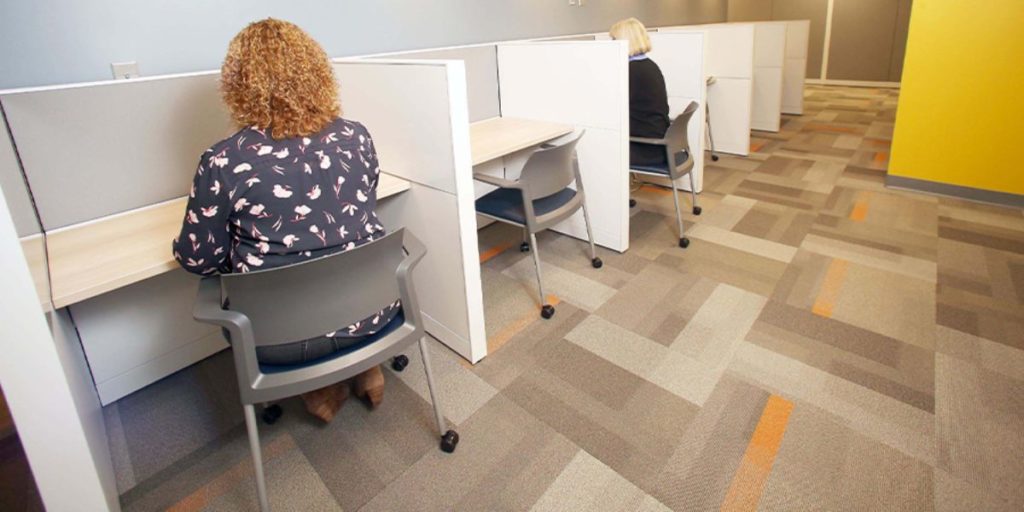
Will Remote Workers Looking For Office Space Be The New Norm?
COVID-19 has changed many aspects of our lives, including how we work and do business. The pandemic showed many companies that telecommuting is not only possible, but it can make some companies more productive than they ever thought possible.
Telecommuting has now taken a firm hold in the business world. As the economy waivers, more companies are now reducing the amount of office space they have available and asking people to work from home.
The exact number of remote workers isn’t yet known, but research indicates that close to 50% of the US workforce now works remotely at some frequency. Telecommuting is not a novel concept; it was first suggested as an option after the 9/11 attacks, but it never came to fruition because the technology for telecommuting was still in its infancy.
A lot has changed over the past 20 years, and today telecommuting has become the norm for many and unlikely to disappear anytime soon.
The physical office space is fast becoming obsolete, and in many instances, has completely disappeared. Just as online shopping devastated the shopping mall, it appears that telecommuting is going to do the same to the physical office.
Large corporations like Twitter, Facebook, and Google have been operating remotely for many years and have done remarkably well. The same modus operandi is now being applied by many companies that are encouraging people to work from home. Wondering why? There are benefits on both sides.
The Benefits for Employees
Remote working has many advantages both for the employee including:
- Lack of a commute
- Less stress
- Fewer regular work-related conflicts for both the employee and employer
- Flexible working hours
- More time with family
- Work from anywhere with an internet connection
- Less management oversight
Employers See Benefits as Well
Employees aren’t the only ones who realize benefits from remote work. Employers may also see some benefits, including:
- Increased productivity
- Fewer costs for physical workspaces
- Lower technology fees
A Rosy Picture?
While there are many positives to telecommuting, there are some real drawbacks for both employers and employees. Employees may feel professionally isolated.
They may not have the home office space, technology, or internet speed to work well from home. Employers may have difficulty managing a large remote team.
It can also be tough to monitor employee productivity closely. Much of what’s been said about remote work, though, is incredibly positive, and that leads many employers to wonder whether they even need office space these days.
Are Offices Even Relevant?
Modern-day technology has made it possible to do many jobs remotely, so the need for centralized office space is mostly gone. After all, most employees already have laptops that go back and forth from work to home anyway, and thanks to tracking software, managers can understand what’s getting done and when in real-time. Moreover, eliminating the physical office space many companies once relied on has resulted in benefits for employers, including:
- No large lease fees
- No huge monthly rent
- No added equipment costs
- No utility bills
- No need for physical security
- No need for furniture
Countless reports indicate that physical offices now remain empty even in prime locations. Companies have realized that they can still have the same efficiency and productivity with dedicated remote workers, so many are giving up their office spaces.
This doesn’t apply to some industries. For some professionals, working remotely may not be an option, particularly in the following professions:
- Specialty professionals like surgeons and dentists
- Operational engineers
- Physical jobs involving manual labor
- Brick and mortar retail employees
- Firefighters
- Law Enforcement
- Pharmacists
- Therapists
- EMT
- Lab technologists
- Skilled laborers like electricians and plumbers
- Public and private transport professionals
- Airline team members
- Tourism specialists
- Food industry professionals
Though most other industries can leave those office spaces empty, remote work may very well be the future norm.
What Happens to All of that Office Space?
There are many reports that the demand for leasing office space has dropped in most cities. This drop is expected to increase over the next few years.
Furthermore, the pricing of leasing and renting office space has dropped significantly, and many high-end office complexes have seen the worst of this scenario.
Surveys indicate that many employees who are currently working remotely have no plans to return to the office and may continue working from home even after the pandemic is over.
However, the final say whether the employee returns to the office will depend on the employer. Most experts indicate that employers will have to seduce the employees with some type of incentive far better than working from home.
Currently, the commercial real estate industry is in free fall, but things may change once most Americans have been vaccinated.